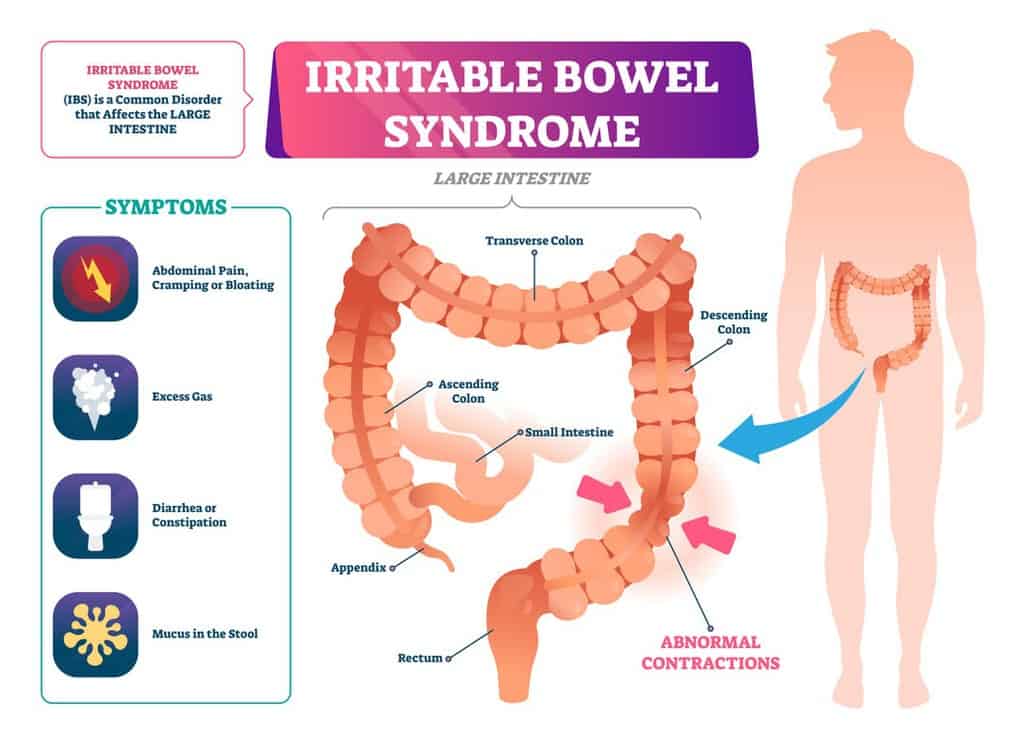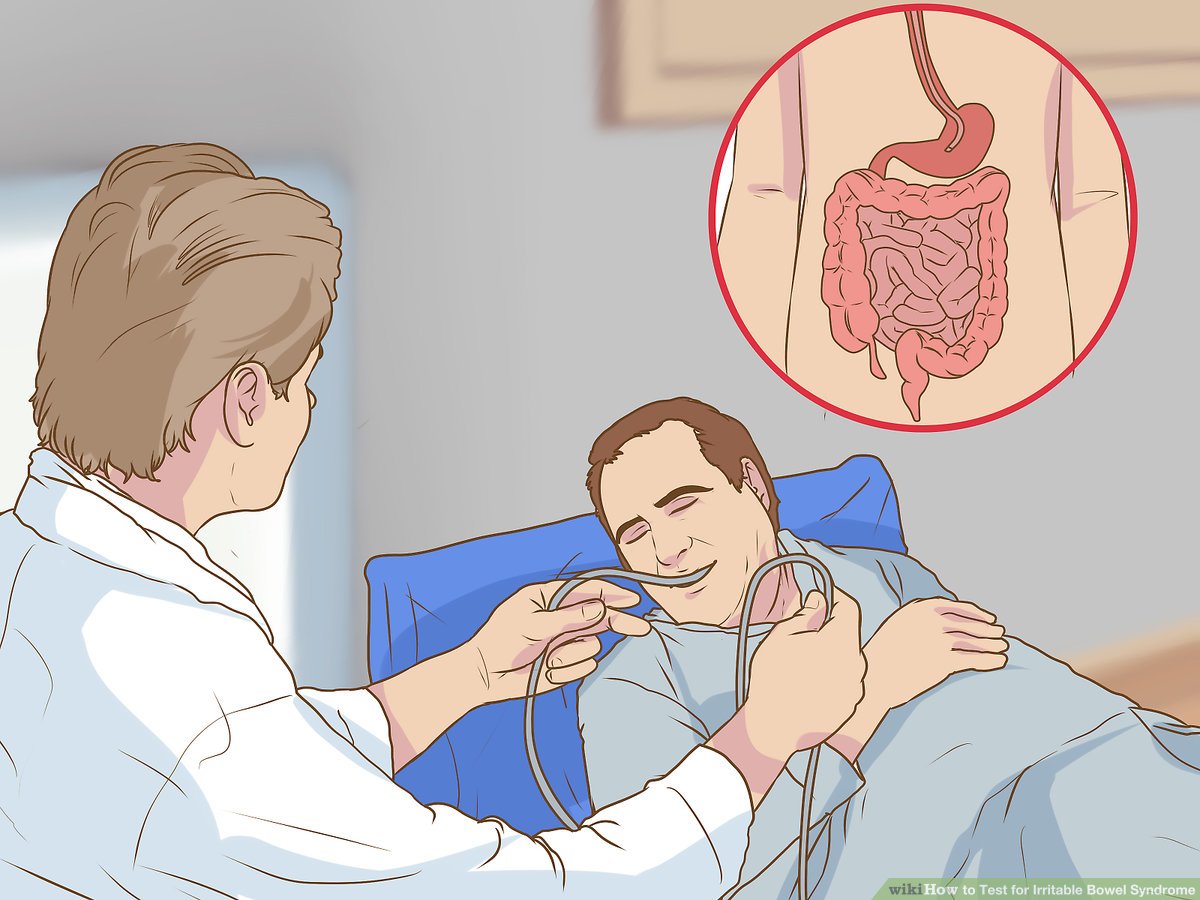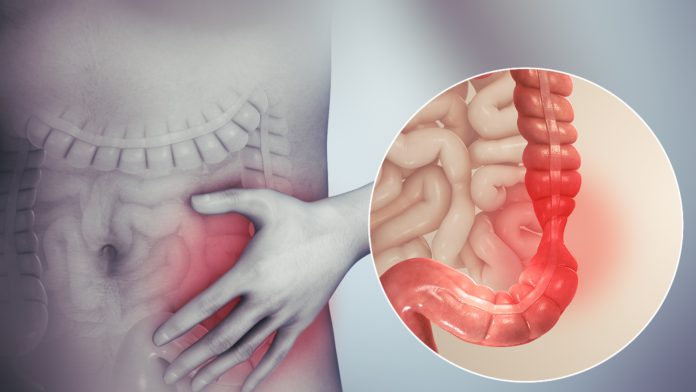Irritable bowel syndrome (IBS) is one of the most common digestive disorders. It is also known as spastic colon. This gastrointestinal problem is characterised by strong abdominal pain and changes in bowel habits. The condition often develops in teenagers or young adults, and will flare up during times of stress. IBS is known as a functional disorder because no underlying cause for it has been identified.
Digesting food moves through the intestines as the result of rhythmical muscular contractions known as peristalsis. For some people with IBS the contractions are irregular and abnormally strong, while for others the contractions may be normal, or may be exaggerated, rather than abnormal. Spasms of pain can occur and there may be an excess or decrease of fluid inside the bowel.

Symptoms of Irritable Bowel Syndrome
- Bowel movements have no regular pattern
- Urgent diarrhoea, constipation, or alternating bouts of each
- A swollen abdomen or bloating
- Abdominal pain and/or cramps
- Flatulence or excessive gas
- Related symptoms may include fatigue, anxiety and depression
How is Irritable Bowel Syndrome Diagnosed?

For people under 35 who apart from the IBS are generally in good health, the diagnosis is normally based on symptoms alone. However tests are often undertaken to rule out other disorders that have similar symptoms. Similar symptoms can occur with inflammatory bowel disorder, Crohn’s disease, or various types of gastrointestinal cancer.
Tests can include rectal examination, barium x-rays to provide an image of the digestive tract, sigmoidoscopy and occasionally a colonoscopy. A sigmoidoscopy is a minimally invasive treatment where a viewing device is used to examine the rectum and part of the large intestine. Colonoscopy examines the whole of the large bowel. Tests are more essential in older people as the risk of more serious problems with similar symptoms increases with age.
Irritable Bowel Syndrome Treatment
Treatment of IBS is aimed at minimising discomfort and re-establishing a normal pattern of bowel movements. Your doctor will counsel you on diet and lifestyle and may prescribe medications to add bulk to your stool. IBS is not life-threatening, but can cause a great degree of discomfort and disrupt day-to-day living. For severely painful episodes, drugs may be prescribed to reduce intestinal spasm.

A variety of lifestyle measures can often help to regulate the bowels. Sufferers of IBS should:
- Keep a diary or journal to help identify lifestyle factors that trigger problems.
- Have regular moderate exercise
- Moderate caffeine and alcohol consumption
- Avoid foods that can trigger flatulence, such as beans and cabbage
- Try a high fibre diet and monitor the results in the journal
It is often suggested that extra fibre should come from vegetables, rice, and fruit, rather than bran, as bran can worsen the condition for some IBS sufferers. If a high-fibre diet does not help, or worsens the condition, a bland diet may help. Irritable Bowel Syndrome is a highly variable disorder which affects individuals differently. Therefore, it is important to identify, and then avoid, foods or activities that may worsen your condition.
As the primary treatment for the disease is a lifestyle change, rather than medication, it is important to learn more about your bowel’s response to your habits. Keeping a journal helps people find if they react badly to certain foods. Sometimes, simply eating smaller meals can help. Stress normally worsens the condition, and paying special attention to relaxation techniques or even undergoing psychotherapy can assist.
Any persistent deviation in bowel habits should be reported to your doctor. If you are already under treatment for irritable bowel syndrome, call your doctor if you experience any prolonged change or worsening of your symptoms, or pass blood in the stools, as this can be a warning symptom of colon cancer.


















